SCA overturns ruling on WCED's record disclosure in unplaced learner case

The Supreme Court of Appeal has reversed a ruling compelling the Western Cape Education Department to provide detailed records regarding out-of-school learners.
Image: Phando Jikelo/African News Agency(ANA) / FILE
The Supreme Court of Appeal (SCA) has overturned a ruling that ordered the Western Cape Education Department to hand over more detailed records in a case about out-of-school learners in the Metro East district - a matter that also challenged the department’s handling of late applications and alleged systemic discrimination.
The Equal Education Law Centre (EELC) brought the case to the High Court, seeking both urgent relief for unplaced learners and broader systemic accountability from the department. While the urgent part of the application fell away after the affected learners were eventually placed, the second part challenged the department’s failure to address late applications and alleged that its conduct unfairly discriminated against learners. Part B sought various forms of review, declaratory and mandatory relief.
Acting Judge Pitso Ephraim Molitsoane ruled: “At no stage had EELC sought to amend its notice of motion to align with the broader averments made in its supporting affidavit. When the high court dealt with the rule 30A application (sought an order compelling the Department to file with the Registrar and EELC, ‘a complete record containing all documents and all electronic records), the relief sought remained confined to the review of alleged failures or refusals by the Department in respect of the 2022 academic year.
"The review relief, as framed in prayers 2 and 3 of Part B, is limited to that academic year and relates specifically to the named unplaced learners and others similarly placed. It was on this basis that EELC sought the production of a record under rule 53(1)(b) (the right to get the full record of the decision that’s being reviewed). However, the high court erred in granting relief that extended beyond the scope of that review. The appeal must be upheld.”
A central issue before the SCA was whether EELC was entitled to compel the Department to furnish a more detailed record beyond what had already been provided, namely, an Excel spreadsheet containing learner placement data.
While the education department did furnish a record, EELC was dissatisfied with its content. In its founding affidavit, it alleged that the record was insufficient. EELC said the information was incomplete and lacked key details, including: the number of unplaced learners in the Metro East district; how many applications were received during 2022; how and where those learners were eventually placed; the policies or guidelines used to make placement decisions; whether schools had waiting lists; and whether schools were oversubscribed, including details on learner-teacher ratios and resource allocation in the district.
The high court granted EELC’s application, ordering the Department to file additional documents and information.
However, the WCED contended that the record was complete, asserting that the record included all online and manual applications of learners known to the department; all applications received by the department; and the actual placements (or offers of placement) in respect of each learner.
“Crucially, what was before the high court was not the review itself, but an interlocutory application to compel production of a record. That application could only succeed to the extent that it concerned the review relief properly framed in Part B. In addition, EELC expressly framed the relief sought in Part B as being confined to the 2022 academic year. In its founding affidavit, it stated: ‘…for this Honourable Court to determine the reasonableness and legality of the [Department’s] delay in placing the [l]earners as well as similarly placed learners, the complete rule 53(1)(b) record and reasons are required, which should include the information and documents listed in paragraph 11…’. However, the list contained in paragraph 11 includes materials that bear no relation to any alleged administrative decision subject to review. These include, for example, plans for the 2023 academic year, district-level resource allocations, and general data intended to support systemic declaratory or structural relief. Such relief is not dependent on the legality of a particular administrative decision, and therefore does not fall within the ambit of rule 53(1)(b). In compelling the production of information unrelated to reviewable conduct, the high court erred both procedurally and substantively,” court papers read.
Molitsoane noted the EELC in this case raises important statutory and constitutional issues relating to the right to education.
"It cannot be said that the application is frivolous or even vexatious. While the application is interlocutory, I hold the view that although unsuccessful, in line with the Biowatch principle, the respondents should not be saddled with costs,” .
The WCED welcomed the outcome.
“We are pleased that the Supreme Court of Appeal has decided in our favour and set aside the High Court ruling, as the EELC was seeking documentation that was determined to be beyond the scope of the review. The named learners in the case were placed in schools a number of years ago, and we maintain that these matters can be resolved without the need for costly court action,” said Kerry Mauchline, spokesperson for Education MEC, David Maynier.
EELC was studying the judgement.
Cape Times